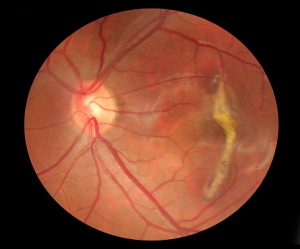 An experimental drug being developed by researchers at Johns Hopkins University is showing promise for simplifying the treatment of age-related macular degeneration. The drug, currently called AXT107, has only been tested in rabbits and mice so far, but the results are encouraging.
An experimental drug being developed by researchers at Johns Hopkins University is showing promise for simplifying the treatment of age-related macular degeneration. The drug, currently called AXT107, has only been tested in rabbits and mice so far, but the results are encouraging.
Professor of ophthalmology, Dr. Peter Campochiaro, anticipates that the effects of the drug will last longer than current treatments, meaning injections will be needed on a much less frequent basis. Currently, the standard treatment for macular degeneration requires an eye injection every four to six weeks, but the development of AXT107 could mean that patients will only require an injection every two months. This is because of the drug’s gel like consistency, which allows it to break down and be released over a longer period. Less doctor’s visits and less eye injections could drastically improve the quality of life of those affected by macular degeneration.
Advertisement
Age-related macular degeneration is the most common cause of vision loss among Americans aged 60 and older, as per the U.S. National Institutes of Health. While this form of macular degeneration does not lead to total blindness on its own, it does affect central vision and causes issues when trying to perform simple tasks like cooking, driving, recognizing faces, reading, and writing. This is because when macular degeneration occurs, it damages the macula—a small area near the center of the retina that is vital in retaining sharp vision. As the degeneration gets worse, a blurred area in the center of your vision may get larger, and blank spots can develop.
Testing has shown that AXT107 can also be used in treating “wet” macular degeneration, where blood vessels form and leak fluids and blood into the eye, resulting in swelling and damage. The current treatment for this form of macular degeneration requires injections directly into the eye on a monthly basis in order to prevent irreversible damage and vision loss. The new drug is proving to be twice as effective in animals, lasting double the amount of time and requiring less injections than the standard treatment. It also targets more factors of blood vessel growth than existing treatments, making it more effective in slowing the process of wet macular degeneration.
Though more research is needed before AXT107 can be used as a human treatment for macular degeneration, the results of these trials are promising, and researchers are hoping to begin human testing as early as this year.
Related: Age-related macular degeneration in its early stages may be reversed with laser treatment: Study
